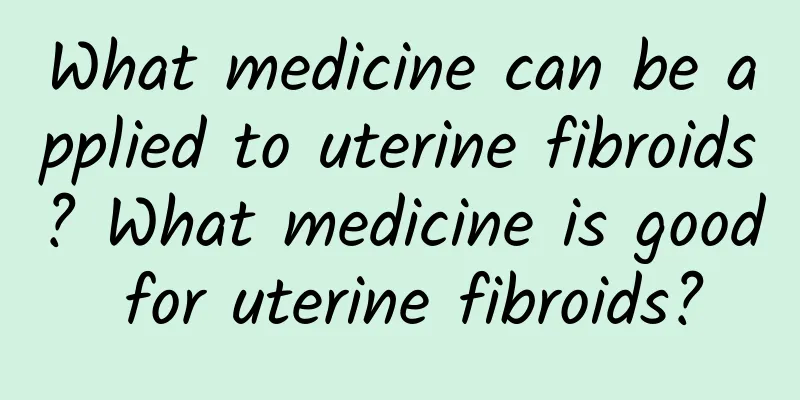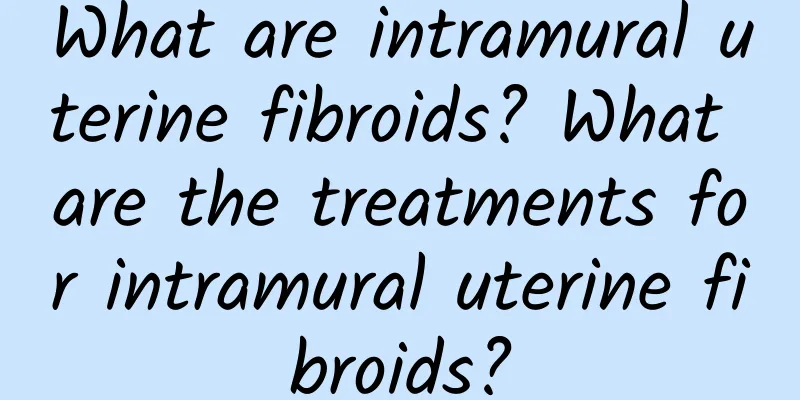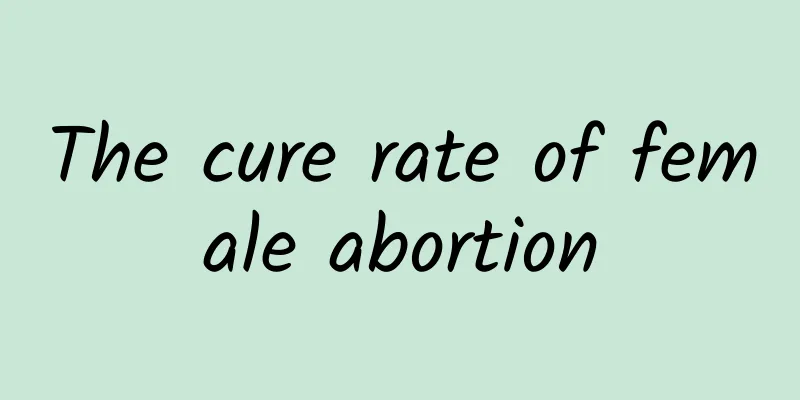What medicine can be applied to uterine fibroids? What medicine is good for uterine fibroids?

|
Uterine fibroids are a common benign tumor in gynecology. They will not disappear on their own and may cause discomfort and pain. Many patients will ask a question: "What medicine can be applied to uterine fibroids?" In fact, there is currently no effective topical medicine that can treat uterine fibroids. However, there is no need to worry, because there are other treatment options. Uterine fibroids are formed by abnormal proliferation of uterine myometrial cells, and their growth is affected by estrogen. Therefore, regulating estrogen levels is the key to treating uterine fibroids. In medicine, the symptoms of uterine fibroids can be relieved through drug therapy or surgical intervention. Drug therapy is one of the most common non-surgical treatments. These drugs mainly include: oral contraceptives, progesterone drugs and receptor modulators. Oral contraceptives can inhibit ovulation, reduce endometrial hyperplasia and regulate estrogen levels, thereby relieving the symptoms of uterine fibroids. Progesterone drugs can inhibit luteinization of the ovaries and reduce estrogen secretion, thereby reducing the size of uterine fibroids. Receptor modulators can block the stimulation of estrogen on uterine fibroids, thereby relieving symptoms. In addition to drug treatment, surgical treatment is also a common treatment method. Surgical treatment mainly includes uterine fibroid removal and radical uterine myomectomy. For patients with smaller uterine fibroids, uterine fibroid removal is an option that can preserve the uterus and relieve symptoms. For patients with larger uterine fibroids, radical uterine myomectomy is a more thorough treatment method that can completely remove the uterine fibroids. Although drug therapy and surgical treatment are the main methods for treating uterine fibroids, many patients still hope to treat uterine fibroids with topical medications. However, there is currently no specific topical medication that can treat uterine fibroids. This is because uterine fibroids are intrauterine lesions, and topical medications are difficult to penetrate into the deep tissues of uterine fibroids. At the same time, it is difficult for the medication to achieve the purpose of treatment when used locally. There are many ways to treat uterine fibroids, with medication and surgery being the most common. Medication relieves the symptoms of uterine fibroids by regulating estrogen levels, while surgery can remove the uterine fibroids or the entire uterus. However, topical medications are not effective enough to treat uterine fibroids, so they are not recommended. For scientific knowledge, why can't uterine fibroids be treated with topical medications? The main reason is that uterine fibroids are located in the deep tissue of the uterine myometrium, and it is difficult for topical medications to penetrate into these deep tissues. At the same time, it is also difficult for the medication to reach an effective concentration when applied topically, and it cannot play a therapeutic role. Therefore, for the treatment of uterine fibroids, more effective methods such as oral medications or surgical intervention are still needed. |
<<: At what age do uterine fibroids usually occur? At what age do uterine fibroids usually occur?
>>: What to eat after uterine fibroids removal What to eat after uterine fibroids removal
Recommend
What are the symptoms of cervical hypertrophy?
Do you know the symptoms of cervical hypertrophy?...
What is the cure rate of uterine fibroids?
What is the cure rate of uterine fibroids? Most f...
Adnexitis favors white-collar workers
Gynecological diseases have always been a headach...
What diseases does uterine effusion cause?
Uterine effusion is an uncommon disease, also kno...
How to treat ruptured ovarian cysts
What about ruptured ovarian cysts? How are they t...
What are the ways to cause an unexpected miscarriage?
What are the ways to cause an unexpected miscarri...
Premature menopause in infertile women may lead to the development of uterine fibroids
There are many causes of uterine fibroids, and th...
Can I have sex if I have abnormal vaginal discharge? It is not recommended to have sex
Abnormal leucorrhea includes yellow foam, curd, a...
Lose weight to fight aging first! 4 keys to regain your slim figure
Why can’t I lose weight? Obesity is the number on...
What causes pain in the right ovary during menstruation?
What causes pain in the right ovary during menstr...
Progress in research on diagnosis of hyperprolactinemia
In real life, many women suffer from hyperprolact...
A must-have for winter weight loss! Chrysanthemum officinale protects the liver and promotes detoxification
It’s the peak season for hotpot again. For office...
What to eat after abortion to get rid of blood stasis quickly? Should women eat more vegetables and fruits after abortion?
After a woman has just undergone an abortion, her...
Menopausal obesity can easily lead to chronic diseases! Traditional Chinese Medicine: Follow 5 principles, massage 4 acupuncture points, and drink 3 fat-burning teas to help metabolism
Case: Ms. Liu, 49 years old, has recently been ex...
Differences between acute and chronic cervical hypertrophy symptoms
As a manifestation of chronic cervicitis, the sym...









